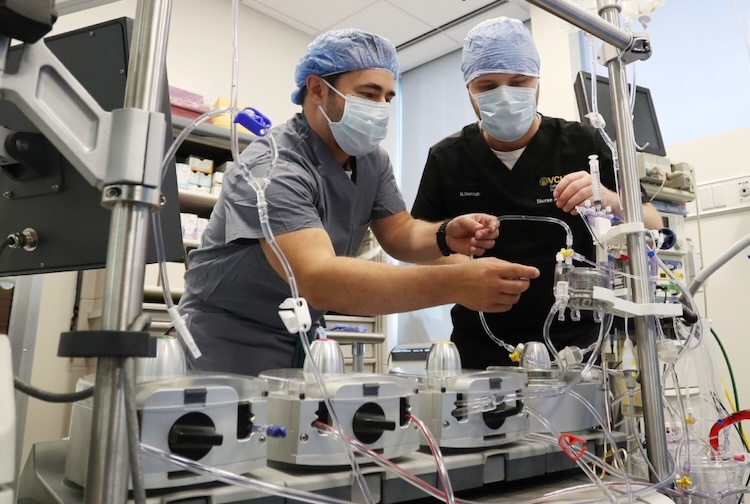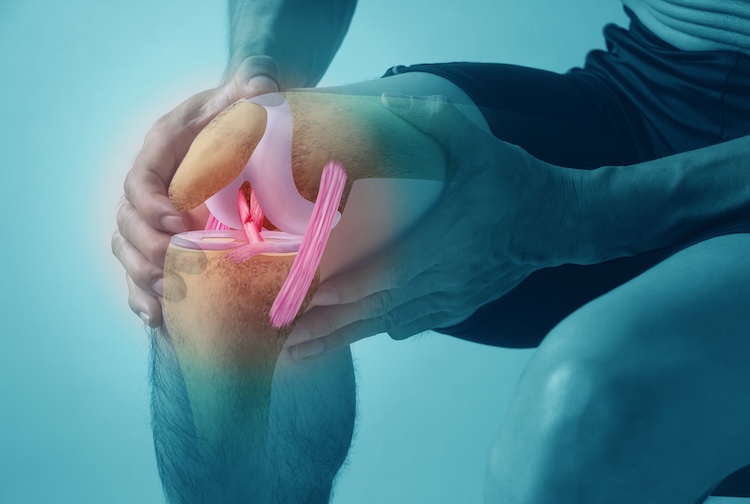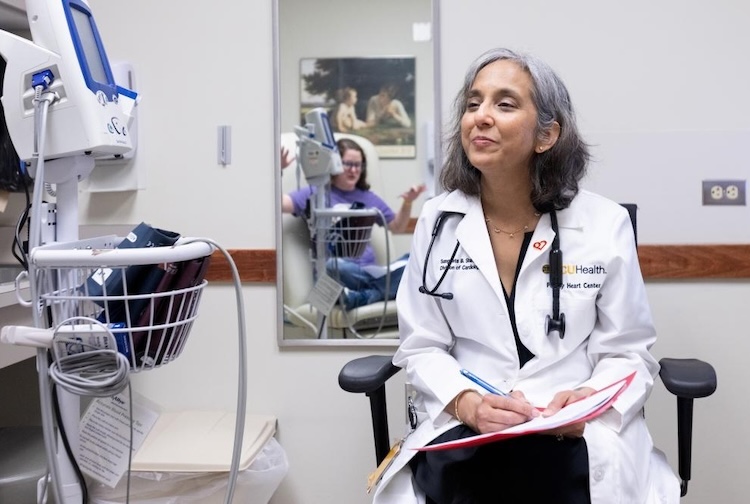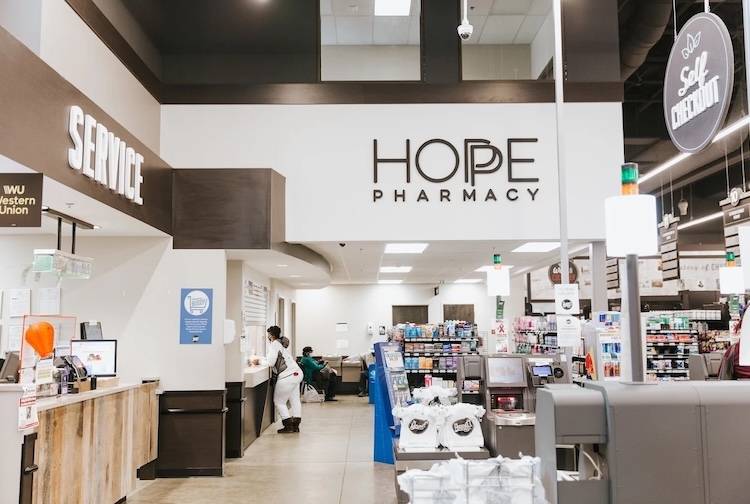VCU to offer Virginia’s first graduate program in key cardiac specialty
Cardiovascular perfusionists are crucial in open-heart surgery, and starting next spring, the College of Health Professions will train new generations.
November 20, 2025 A new VCU graduate program will prepare students for one of the most specialized and critical roles in cardiac care: Perfusionists operate the heart-lung machine during open-heart surgeries. (College of Health Professions)
A new VCU graduate program will prepare students for one of the most specialized and critical roles in cardiac care: Perfusionists operate the heart-lung machine during open-heart surgeries. (College of Health Professions)
By Kyra Newman
Virginia Commonwealth University’s College of Health Professions will launch a graduate program in cardiovascular perfusion in the spring 2026 semester – the first of its kind in Virginia and one of just 22 nationwide.
Offered through the Department of Nurse Anesthesia, the five-semester, 20-month master of science program will prepare students for one of the most specialized and critical roles in cardiac care: Perfusionists operate the heart-lung machine during open-heart surgeries.
“Most people have no idea what a perfusionist does,” said Keith Pelletier, Ph.D., the newly appointed director of the program and a certified clinical perfusionist with 15 years of experience. “We’re the ones who take over the function of the heart and lungs when a patient’s heart is safely stopped during surgery. We keep them alive while the surgeon repairs a patient’s heart.”
As vital members of cardiac surgical teams, perfusionists do more than control the flow of a patient’s blood and oxygen using a heart-lung machine. They also administer cardioplegia – in the technique, a specialized potassium-heavy solution safely stops the heart and, after completion of often lifesaving surgery, helps the heart begin to pump blood again.
“There’s a lot of responsibility. We’re the only ones who can’t leave the room,” Pelletier said. “If you’re on bypass duty for 10 hours, you’re right there at the machine for 10 hours.”
In addition to cardiac surgery, perfusionists can manage extracorporeal membrane oxygenation, a form of life support used in cases of severe heart or lung failure. Use of ECMO surged during the COVID-19 pandemic and remains in high demand.
Details of the new cardiovascular perfusion graduate program
The new VCU program, which has been approved by the State Council of Higher Education for Virginia and the Southern Association of Colleges and Schools Commission on Colleges, will blend classroom instruction, simulation-based training and clinical experience. Among its elements:
- Students will work with state-of-the-art equipment, including the Califia Patient Simulator, as well as real heart-lung machines.
- In the first year, students will observe surgeries weekly and participate in intensive simulations.
- By the third semester, students begin hands-on clinical rotations at partner hospitals, including VCU Medical Center. There, they will perform perfusion under the supervision of experienced clinicians.
- To graduate, students must complete at least 75 clinical cases under professional supervision. VCU aims for students to participate in more than 100 cases, a standard found in most programs.
- After graduation, students complete an additional 40 supervised clinical cases before they can pursue the required certification by the American Board of Cardiovascular Perfusion.
“There’s a lot of pressure in this job,” Pelletier said. “You need to be calm under stress, think fast and be absolutely sure of what you’re doing. Because if you’re unsure, it might be too late.”
Stepping up to fill a need in Virginia
Perfusion is a small but growing field.
- Today, only around 4,000 perfusionists practice nationwide.
- Demand for trained professionals is especially high in states, including Virginia, that have no in-state education pathway.
- At the same time, heart surgeries and procedures are getting more complex, adding to the need for more perfusionists.
“VCU saw the need and stepped up,” Pelletier said. “Right now, anyone from Virginia who wants to become a perfusionist has to go out of state. And often they stay in those states to work. This program will help keep talent in Virginia.”
The program’s placement within the Department of Nurse Anesthesia, while different compared with some schools, is intentional.
“We work alongside CRNAs and anesthesiologists in the OR every day,” Pelletier said. “Sharing sim labs and training side by side will prepare all students for the teamwork the job demands.”
How VCU and VCU Health’s teamwork built the program
The cardiovascular perfusion program began as a request from VCU Health System leadership, as cardiac surgeons and perfusion teams had long recognized the need for in-state training. The effort, led by Vigneshwar Kasirajan, M.D., FACS, chair of the VCU Health Department of Surgery for VCU Health and the School of Medicine, and Patricia Nicolato, D.O., cardiac surgeon and medical director of the new program, involved years of foundational work.
“There was a group of stakeholders that was really committed,” said Nickie Damico, Ph.D., CRNA, associate professor and Herbert T. Watson Endowed Chair of the Department of Nurse Anesthesia. “They had done years of preliminary work to try to make this come to be.”
Support came from both adult and pediatric perfusion leaders at VCU Health and Children’s Hospital of Richmond at VCU, alongside faculty in the School of Medicine and the College of Health Professions. Funding tied to the VCU Health Pauley Heart Center helped advance the project, and health administration students contributed an early prospectus outlining its feasibility.
“Just considering the types of simulation, the environments we work in and the training we do — there’s a lot of alignment with nurse anesthesia,” Damico said. “We’ve supported high-quality, high-fidelity simulation for years, and we’re simply shifting the content. This program builds on a foundation we already have in place.”
Attracting the inaugural class
Ideal applicants for the cardiovascular perfusion program bring backgrounds in science or health care, often from work as nurses, respiratory therapists or first responders. They also must complete a significant shadowing experience in cardiac surgery.
Beyond academics, Pelletier emphasized character traits such as emotional resilience, adaptability and composure under pressure.
“This field isn’t for everyone,” said Pelletier, noting that the practice is a good fit for individuals who want a career that blends clinical and technical applications. “You’re making life-and-death decisions in a high-stress environment, and you have to be able to work within a tight surgical team. We’re looking for students who know exactly what they’re getting into and are ready to commit.”
VCU will enroll its first cohort of 10 students in early 2026, with future cohorts expanding to 12.
“When I heard VCU was starting a program, I knew I had to be part of it,” Pelletier said. “We’re training the next generation of perfusionists right here in Virginia.”




